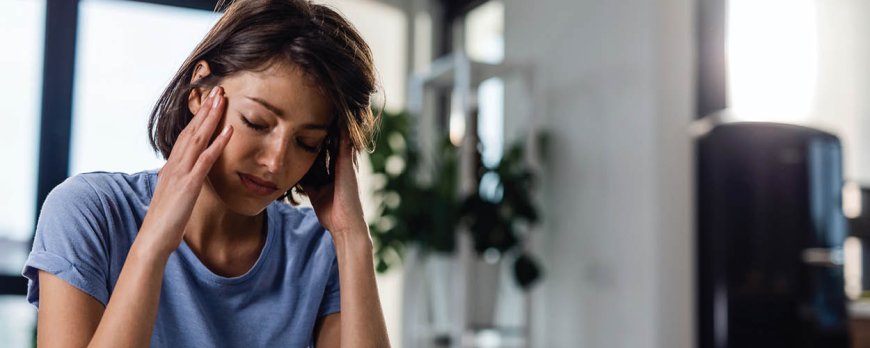What anxiety feels like?
Discover insights into 'What anxiety feels like?' in this comprehensive guide. Uncover the sensations, thoughts, and experiences linked with anxiety.

What Anxiety Feels Like?
Anxiety is a common human experience that can manifest in various ways, causing a range of symptoms and sensations. It is a feeling of nervousness, worry, or unease that can be triggered by stress or specific events. While anxiety can serve as a normal human response, helping us stay focused and alert, it can also become overwhelming and interfere with daily life, resulting in an anxiety disorder.
Key Takeaways:
- Anxiety is a normal human response that can help us stay focused and alert.
- Symptoms of anxiety can include physical manifestations like headaches, muscle tension, and rapid heartbeat.
- On a psychological level, anxiety can lead to excessive worrying, restlessness, irritability, and trouble sleeping.
- There are different types of anxiety disorders, including generalized anxiety disorder, panic disorder, social anxiety disorder, and separation anxiety disorder.
- Treatment options for anxiety disorders can include therapy, medication, or a combination of both.
Physical Manifestations of Anxiety
Anxiety can often be felt in the body, with physical symptoms that can vary from person to person. These physical manifestations are the body's natural response to perceived danger or stress. Recognizing these signs can help individuals identify and address their anxiety.
Common physical symptoms of anxiety include:
- Headaches: Tension headaches are a frequent complaint among those experiencing anxiety. These headaches can range from mild to severe and may be accompanied by a feeling of pressure or tightness in the head.
- Muscle tension: Anxiety often leads to muscle tension, particularly in the neck, shoulders, and back. This tension can result in stiffness, soreness, and aches.
- Rapid heartbeat: During moments of anxiety, the heart may start beating faster than usual, leading to palpitations or a sensation of a racing heart.
- Difficulty breathing: Anxiety can cause shallow breathing or hyperventilation. People may feel short of breath, experience chest tightness, or have the sensation of being unable to take a deep breath.
- Gastrointestinal issues: Anxiety can affect the digestive system, leading to symptoms such as stomachaches, nausea, diarrhea, or constipation.
Other possible physical symptoms of anxiety include:
- Sweating: Excessive sweating, particularly in the palms, is a common manifestation of anxiety.
- Dizziness or lightheadedness: Feelings of dizziness or lightheadedness may occur during moments of anxiety due to changes in blood flow and breathing patterns.
- Fatigue: Anxiety can be mentally and physically draining, leading to feelings of exhaustion and lethargy.
If you or someone you know is experiencing these physical symptoms in conjunction with feelings of anxiety, it may be beneficial to reach out for support from a healthcare professional or mental health provider. Through proper diagnosis and treatment, individuals can learn effective strategies to manage their anxiety and improve their overall well-being.

Psychological Effects of Anxiety
Anxiety not only affects the body but also has profound psychological effects that can impact daily life. It can cause excessive worrying, leading to a constant state of apprehension and fear. This persistent feeling of unease can make it difficult to concentrate and focus on tasks, affecting productivity and performance. The mind becomes consumed by anxious thoughts, often leading to anticipatory anxiety, where individuals worry excessively about future events or outcomes.
Restlessness is another common psychological effect of anxiety. Those experiencing anxiety may feel a constant need to move or be unable to sit still, as their mind races with worries and fears. This restlessness can be accompanied by irritability and a short temper, as anxiety can heighten sensitivity to stressors and make individuals more prone to agitation.
Trouble sleeping is also frequently experienced by individuals with anxiety. The racing thoughts and worries can make it difficult to fall asleep, leading to insomnia. Conversely, disrupted sleep patterns can exacerbate anxiety symptoms, creating a vicious cycle. Sleep disturbances can further impact mood and overall well-being, making it crucial to address anxiety and its psychological effects.
Managing Anxiety on a Psychological Level
- Identify triggers: Understanding what triggers your anxiety can help you develop strategies to manage and reduce its impact. Keep a journal to track situations, thoughts, or events that cause anxiety.
- Challenge negative thoughts: Practice reframing negative thoughts and replacing them with more positive and realistic ones. This can help to significantly reduce anxiety and its psychological effects.
- Practice relaxation techniques: Deep breathing exercises, meditation, and mindfulness can help calm the mind and reduce anxiety. Engaging in activities that promote relaxation, such as yoga or listening to calming music, can also be beneficial.
- Seek professional help: If anxiety is significantly impacting your daily life or you find it difficult to manage on your own, consider seeking support from a mental health professional. They can provide guidance and therapy techniques tailored to your specific needs.
Remember, anxiety is a common human experience, and it's important to prioritize self-care and seek support when needed. By understanding and managing the psychological effects of anxiety, individuals can regain control over their lives and improve their overall well-being.
Types of Anxiety Disorders
Anxiety can be classified into various disorders, each with its own unique characteristics and symptoms. These disorders can have a significant impact on a person's daily life and overall well-being. Here are some of the most common types of anxiety disorders:
- Generalized Anxiety Disorder (GAD): People with GAD experience excessive and uncontrollable worry about everyday life events and situations. This chronic condition is often accompanied by physical symptoms such as muscle tension, fatigue, and difficulty concentrating.
- Panic Disorder: Panic disorder is characterized by recurring and unexpected panic attacks. These attacks are intense periods of fear and anxiety that are accompanied by physical symptoms such as a rapid heartbeat, shortness of breath, and a sense of impending doom.
- Social Anxiety Disorder (SAD): SAD involves an intense fear of social situations and a fear of being judged or humiliated by others. People with SAD may avoid social interactions or endure them with extreme distress, leading to significant impairment in their personal and professional lives.
- Separation Anxiety Disorder: This disorder is commonly seen in children but can also affect adults. It involves excessive fear or anxiety about being separated from attachment figures or loved ones. The fear is often irrational and leads to avoidance of separation or significant distress when separation occurs.
Note: While these are some of the most common anxiety disorders, there are other specific phobias, such as agoraphobia (fear of open or public spaces) and specific phobias (fear of specific objects or situations), that can also fall under the category of anxiety disorders.
Seeking Professional Help
If you suspect that you or someone you know may have an anxiety disorder, it is important to seek professional help. A mental health professional can provide an accurate diagnosis and develop a personalized treatment plan. Treatment options for anxiety disorders may include therapy, medication, or a combination of both. It is essential to remember that anxiety disorders are highly treatable, and seeking support can make a significant difference in managing symptoms and improving overall quality of life.

Understanding Normal Anxiety vs. Anxiety Disorders
It is essential to distinguish between normal anxiety, which is a natural response to stress, and anxiety disorders, which require professional support and intervention. Normal anxiety is a temporary state that arises in response to challenging or stressful situations. It can be beneficial, as it helps us stay focused and alert. However, when anxiety becomes overwhelming and consistently disrupts our daily lives, it may indicate an anxiety disorder.
Anxiety disorders are characterized by persistent feelings of fear, worry, and unease that extend beyond what is considered normal. They can manifest in various forms, such as generalized anxiety disorder, panic disorder, social anxiety disorder, and separation anxiety disorder. These disorders often cause significant distress and impairment in areas such as work, relationships, and overall well-being.
Recognizing the signs of anxiety disorders is crucial in order to seek appropriate support. Physical symptoms may include headaches, difficulty concentrating, muscle tension, and a rapid heartbeat. On a psychological level, individuals with anxiety disorders may experience excessive worrying, restlessness, irritability, and sleep disturbances. If you or someone you know is experiencing these symptoms regularly and they are impacting daily life, it is important to reach out for professional help.
The following are some key points to consider:
- Anxiety is a normal response to stress, but when it becomes chronic and interferes with daily life, it may indicate an anxiety disorder.
- There are different types of anxiety disorders, including generalized anxiety disorder, panic disorder, social anxiety disorder, and separation anxiety disorder.
- Anxiety disorders can cause physical and psychological symptoms that significantly impact overall well-being.
- If you or someone you know is experiencing symptoms of anxiety on a regular basis, it is essential to seek professional support and intervention.
Treatment Options for Anxiety Disorders
Managing and treating anxiety disorders typically involves a tailored approach that may include therapy, medication, or a combination of both. It is important to work closely with a healthcare professional to determine the most effective treatment plan for your specific needs.
1. Therapy: Psychotherapy, also known as talk therapy, is a common treatment for anxiety disorders. Through therapy, individuals can explore their thoughts, feelings, and behaviors in a supportive and nonjudgmental environment. Techniques such as cognitive-behavioral therapy (CBT) can help identify and challenge negative thought patterns, while exposure therapy can assist in gradually confronting and overcoming fears.
2. Medication: Certain medications, such as selective serotonin reuptake inhibitors (SSRIs) or benzodiazepines, may be prescribed to help manage anxiety symptoms. SSRIs work by increasing the levels of serotonin, a neurotransmitter that regulates mood, while benzodiazepines can provide short-term relief by calming the central nervous system. It is important to note that medication should always be used under the guidance and supervision of a healthcare professional.
3. Combination approach: In some cases, a combination of therapy and medication may be recommended for more comprehensive treatment. This approach can address both the underlying causes of anxiety and provide immediate symptom relief. It is crucial to regularly communicate with your healthcare provider to assess the effectiveness of the treatment plan and make any necessary adjustments.
Remember, each individual's experience with anxiety is unique, and what works for one person may not work for another. It may take time to find the right treatment approach that suits your needs, so be patient and persistent in your journey towards managing anxiety.
Seeking Support for Anxiety
When anxiety becomes overwhelming and affects daily life, seeking support can be crucial for managing and overcoming anxiety-related challenges. Building a support system and seeking professional help can provide valuable resources to navigate the complexities of anxiety.
Here are some strategies for seeking support:
- Reach out to friends and family: Sharing your feelings with loved ones can provide a sense of relief and understanding. They can offer emotional support and may have their own experiences with anxiety to relate to.
- Consider therapy: Talking to a licensed therapist or counselor can help you explore the root causes of your anxiety, develop coping mechanisms, and learn new strategies for managing stress. Therapy can provide a safe space to express your feelings and receive guidance.
- Join support groups: Connecting with others who are experiencing similar challenges can offer validation and a sense of community. Support groups provide an opportunity to share experiences, learn from others, and gain valuable insights.
- Practice self-care: Engaging in activities that promote self-care can be beneficial for managing anxiety. This can include activities such as exercise, meditation, journaling, or engaging in hobbies that bring you joy and relaxation.
Remember, seeking support is not a sign of weakness but a proactive step towards taking control of your well-being. Understanding anxiety and finding the right support system can make a significant difference in managing anxiety and improving overall mental health.

The Role of Stress in Anxiety
Stress and anxiety are closely intertwined, with stress often acting as a catalyst for anxiety. When we experience stress, whether it be from work, relationships, or other life events, our body goes into a heightened state of alertness. This response is commonly known as the "fight or flight" response, where our body prepares itself to either face the stressor head-on or flee from it. However, when this stress response becomes chronic or overwhelming, it can lead to the development of anxiety.
Chronic stress can overwhelm our ability to cope, leading to a persistent feeling of anxiety. It can affect our physical and mental well-being, causing symptoms such as racing thoughts, difficulty concentrating, and muscle tension. The constant activation of our body's stress response system can also lead to an increased risk of developing an anxiety disorder.
The Impact of Stress on the Brain
Stress affects the brain in various ways, altering the balance of chemicals and neurotransmitters that regulate mood and emotions. Chronic stress can lead to an overproduction of stress hormones, such as cortisol, which can disrupt the normal functioning of the brain. This can result in heightened anxiety and a decreased ability to regulate emotions effectively.
To manage anxiety, it is essential to identify and address the underlying stressors in our lives. This can be done through various stress management techniques, such as practicing mindfulness, engaging in regular exercise, and seeking support from loved ones or professionals. By managing stress effectively, we can reduce the risk of developing or exacerbating anxiety symptoms.
- Practice stress management techniques such as deep breathing, meditation, or journaling
- Engage in regular physical activity to help reduce stress levels
- Seek support from loved ones or a mental health professional
- Establish healthy boundaries and prioritize self-care
By understanding the role of stress in anxiety and implementing effective stress management techniques, we can work towards maintaining a healthier mental state and overall well-being.
Strategies for Coping with Anxiety
There are various strategies that can help individuals cope with anxiety and reduce its impact on their day-to-day lives. It is important to find what works best for you and incorporate these techniques into your routine. Here are some strategies to consider:
- Deep breathing exercises: Practice deep breathing exercises to help calm your mind and body. Take slow, deep breaths in through your nose, hold for a few seconds, and then exhale slowly through your mouth. Repeat this process several times, focusing on your breath and allowing yourself to relax.
- Mindfulness practices: Engage in mindfulness activities such as meditation or yoga. These practices can help you become more aware of the present moment, allowing you to let go of racing thoughts and find a sense of calm. There are many apps and online resources available to guide you through mindfulness exercises.
- Exercise regularly: Physical activity has been shown to reduce anxiety and improve mood. Find an exercise routine that you enjoy, whether it's going for a walk, attending fitness classes, or playing a sport. Aim for at least 30 minutes of exercise most days of the week.
- Manage your stress: Stress can exacerbate anxiety symptoms, so it's important to find healthy ways to manage stress in your life. This can include practicing time management techniques, setting realistic goals, and incorporating relaxation activities into your daily routine.
Seeking Professional Help
If your anxiety is significantly impacting your daily life and well-being, it may be beneficial to seek professional help. A qualified therapist or counselor can provide you with additional coping strategies and support tailored to your specific needs. They may recommend therapy techniques such as cognitive-behavioral therapy (CBT) or exposure therapy to help you manage and overcome anxiety.
Remember, coping with anxiety is a journey, and it is important to be patient with yourself. By implementing these strategies and seeking support when needed, you can develop effective ways to manage anxiety and improve your overall well-being.

The Importance of Self-Care in Managing Anxiety
Taking care of oneself is crucial in managing anxiety, as self-care practices can provide a sense of calm and promote overall mental health. When dealing with anxiety, it is essential to prioritize self-care to help reduce stress, alleviate symptoms, and enhance well-being. By incorporating self-care activities into your routine, you can create a supportive environment for managing anxiety effectively.
Here are some self-care strategies that can aid in coping with anxiety:
- Engage in relaxation techniques: Practicing deep breathing exercises, progressive muscle relaxation, or meditation can help calm the mind and body, reducing stress and anxiety levels.
- Prioritize sleep: Establishing a consistent sleep routine and ensuring an adequate amount of quality sleep can positively impact your mental health and overall well-being. Sleep plays a vital role in regulating mood and reducing anxiety.
- Stay physically active: Regular exercise releases endorphins, which are natural mood boosters. Engaging in physical activities that you enjoy, such as walking, dancing, or yoga, can help manage anxiety and improve overall mental and physical health.
- Nurture social connections: Maintaining strong and supportive relationships with friends and family can provide a sense of belonging and emotional support. Sharing your feelings and experiences with trusted individuals can alleviate anxiety and provide valuable perspective.
- Practice mindfulness: Engage in activities that promote mindfulness, such as journaling, practicing gratitude, or spending time in nature. These can help you stay present in the moment, reduce racing thoughts, and foster a sense of inner peace.
Seeking professional help
If your anxiety symptoms persist or significantly impact your daily life, it is essential to seek professional help. Mental health professionals, such as therapists or counselors, can provide guidance, support, and evidence-based treatment options tailored to your specific needs. They can help you develop effective coping strategies and assist in managing anxiety more effectively.
Remember, self-care is an ongoing process, and what works for one person may not work for another. It's important to experiment with different self-care practices and develop a routine that suits you best. By incorporating self-care into your life, you can empower yourself to better manage anxiety and improve your overall well-being.

Breaking the Stigma Surrounding Anxiety
Breaking the stigma surrounding anxiety is essential in creating a society that supports individuals struggling with anxiety and promotes mental well-being. Anxiety is a common human experience, and it is important that we strive to understand and empathize with those who are affected by it. By promoting awareness and education about anxiety, we can combat the misconceptions and prejudices that often surround this mental health condition.
One way to break the stigma surrounding anxiety is by fostering open conversations about mental health. Encouraging individuals to share their experiences and feelings without judgment can create a safe space where people feel comfortable seeking help and support. This can be done through community events, support groups, or even online platforms. It is crucial that we listen, validate, and offer support to those who are struggling with anxiety, as it can make a significant difference in their journey towards healing and recovery.
Another important aspect is to provide accurate information about anxiety and debunk any myths or misconceptions. By sharing factual data and raising awareness about the symptoms and effects of anxiety, we can help others understand that it is a legitimate condition and not just a result of weakness or personal failure. This knowledge can empower individuals to seek professional help and make informed decisions about their mental health.
Lastly, promoting self-care and mental well-being can also help break the stigma surrounding anxiety. Encouraging individuals to prioritize their mental health, practice self-compassion, and engage in activities that promote relaxation and stress reduction can create a culture that values emotional well-being. By emphasizing the importance of self-care, we can change the narrative around anxiety and foster an environment where seeking support is seen as a strength rather than a weakness.
Conclusion
Understanding what anxiety feels like and learning to manage its symptoms and emotions is crucial for improving one's quality of life and promoting mental health. Anxiety is a normal human response to stress or specific events, but when it becomes overwhelming and interferes with daily life, it may be classified as an anxiety disorder.
Physical manifestations of anxiety can include headaches, difficulty concentrating, muscle tension, and a rapid heartbeat. On a psychological level, anxiety can lead to excessive worrying, restlessness, irritability, and trouble sleeping. Different types of anxiety disorders, such as generalized anxiety disorder, panic disorder, agoraphobia, social anxiety disorder, and separation anxiety disorder, can have varying symptoms and intensities.
Treatment options for anxiety disorders can include therapy, medication, or a combination of both. It is important to distinguish between normal anxiety and an anxiety disorder, as well as to seek support if anxiety becomes a chronic issue. Strategies for coping with anxiety, such as deep breathing exercises, mindfulness practices, and self-care routines, can also be beneficial in managing symptoms and promoting emotional well-being. Breaking the stigma surrounding anxiety and fostering a supportive environment is essential for individuals dealing with anxiety to feel understood and accepted.
In conclusion, by understanding anxiety, recognizing its symptoms and emotions, and seeking appropriate support and treatment, individuals can effectively manage anxiety and improve their overall well-being. Taking steps to prioritize self-care and practicing strategies for coping with anxiety can greatly contribute to reducing its negative impact on daily life. With the right knowledge and support, it is possible to navigate the challenges of anxiety and lead a fulfilling and balanced life.
FAQ
Q: What is anxiety?
A: Anxiety is a feeling of nervousness, worry, or unease that can be caused by stress or a specific event. It is a normal human response and can help you stay focused and alert.
Q: What are the symptoms of anxiety?
A: Symptoms of anxiety can include physical manifestations such as headaches, difficulty concentrating, muscle tension, and rapid heartbeat. On a psychological level, anxiety can lead to excessive worrying, restlessness, irritability, and trouble sleeping.
Q: What are the different types of anxiety disorders?
A: Different types of anxiety disorders include generalized anxiety disorder, panic disorder, agoraphobia, social anxiety disorder, and separation anxiety disorder.
Q: How are anxiety disorders treated?
A: Treatment options for anxiety disorders can include therapy, medication, or a combination of both.
Q: How can I distinguish between normal anxiety and an anxiety disorder?
A: It is important to recognize when anxiety becomes overwhelming and interferes with daily life. If anxiety becomes a chronic issue, it may be classified as an anxiety disorder, and seeking support is recommended.


































































































































